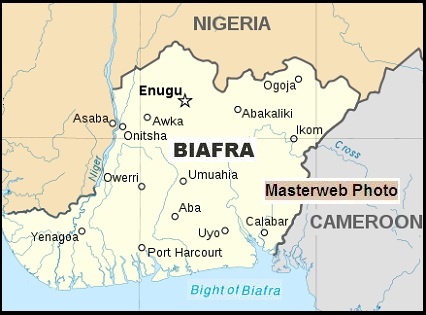
Half a century after the war, angry Biafrans are agitating again
MOST Nigerians do not remember their country’s civil war. A large majority were born years after the 30-month fight between Nigeria and the breakaway region of Biafra, which ended when the secessionists surrendered in 1970. Yet over the past month independence protests have erupted in cities across the south-east, where the self-declared state once was. Agitators say that this time they will not be beaten. “Biafra is a country to be restored,” declares one of them. “We are determined to fight to the end.”
This is a concern for Nigeria’s new government. Secessionist organisations in Biafra have been agitating for years, but analysts reckon the scale of the current marches is unprecedented. Superficially, they were sparked by the arrest of Nnamdi Kanu, the outspoken head of the Indigenous People of Biafra (IPOB) movement, and director of Radio Biafra, a pirate station. But the grievances run deep.
Nigeria did not exist until British colonialists drew a line around hundreds of fractious ethnic groups dominated by the Igbo in the east, the Yoruba in the west, and the Hausa-Fulani in the north. The country’s regions have jostled for power ever since. Predominantly Igbo protesters have not forgotten that tens of thousands of their people were killed before Biafra unilaterally declared independence in 1967. Between 1m and 3m people died during the war, many as the rebel territory was starved into defeat. In the 45 years since the war ended, they feel they have been blocked from senior political posts, denied public services, and impoverished by a post-war programme that they say auctioned off their houses and returned just £20 ($320, in today’s money) to them.
In the presidential election in March most south-easterners voted for the incumbent, Goodluck Jonathan, who comes from their region. He lost to Muhammadu Buhari, a Muslim from the north. “#NigeriaWillRot”, Mr Kanu’s radio station declared after the results were announced. Politicians have fired up impressionable agitators by claiming that the new government is marginalising Igbos, says Nnamdi Obasi of the International Crisis Group, a think-tank. In the oil-rich Niger Delta, a revolt beginning in the 1990s was focused more on winning power and a share of the spoils than on ideology. Many analysts think the same is true today.

So far the demonstrations have been mostly peaceful, though locals say shops have been looted and tyres set ablaze, and protesters claim police have killed several of their crew (the police deny those charges). That could change if Mr Kanu is killed or mistreated by Nigerian security agents. Boko Haram sets an unhappy precedent. The Islamist movement became a full-scale insurgency only after its leader, Mohammed Yusuf, was shot in police detention in 2009. Another worry is the impending end of a six-year-old amnesty for militants from the Delta. They could return to violence if it is not extended next month, spelling wider instability in the region.
Mr Kanu is not averse to playing with fire. He called for arms earlier this year and an unverified Twitter page in his name is full of extreme rhetoric and images of mutilated Biafrans, which Mr Obasi says often seem to be fake. Last week, his radio station inferred from a Boko Haram bombing that the “killing of Igbos in large scale has already commenced”. Many of his followers speak with an equally intimidating tone. “Give us Biafra or we all die getting Biafra,” one of them proclaims.
The real concern is not alleged government brutality but poor governance. Despite huge oil wealth, Nigerians were twice as likely to be poor in 2010 as they were in 1980. Frustration is not confined to the south-east. Poverty and joblessness have driven conscripts into the arms of Boko Haram terrorists, who want to establish a caliphate in the mostly Muslim north-east. Insurgents battled for self-rule in the Delta until they were paid to stop. Over the years, too many of Nigeria’s politicians have been too busy filling their pockets to think of solving the common underlying problems, ignoring them until they got out of control.
news source



Post A Comment:
0 comments:
Note: only a member of this blog may post a comment.